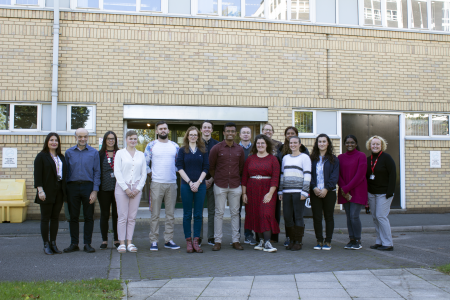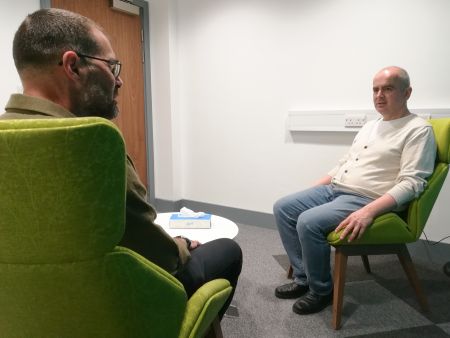National research centre to tackle musculoskeletal disorders in the workplace

National research centre to tackle musculoskeletal disorders in the workplace
Tuesday 25 November 2014
Academics from the University of Salford will be involved in a major new research centre to tackle the impact of musculoskeletal disorders on people’s ability to work which has been announced by two leading medical research bodies.
Their work will be feeding into the £1.4m Arthritis Research UK/MRC Centre for Musculoskeletal Health and Work, based at the University of Southampton, aim to find cost-effective ways of reducing the impact of conditions that affect the muscles, joints and bones on people’s employment and productivity, with benefits for patients, employers and society as a whole.
Professor Alison Hammond, Professor at Salford’s Centre for Health Sciences Research, said: “We have already had a three year grant, funded by ARUK, to evaluate a pilot brief work rehabilitation programme for people with inflammatory arthritis, who are working but having some difficulties at work because of their arthritis. This had promising results.
“We will be working with other members of the centre to take forward this research: testing the programme with larger numbers of working people with inflammatory arthritis and with other types of arthritis. Additionally, we are planning work to investigate the problems working people with arthritis face at work, which can help to help with planning services.”
Director of the new Arthritis Research UK/MRC centre, Professor David Coggon, said: “Musculoskeletal conditions are a major cause of sickness absence and job loss. We’re enormously excited about our new centre which we hope will lead to new ways of preventing their occurrence, and helping employees who are affected to stay in productive work.”
The Arthritis Research UK/MRC centre will focus its research on the three main musculoskeletal causes of work disability – back, neck and arm pain, osteoarthritis and inflammatory arthritis. A special theme will be the impact of these conditions on older people who are approaching normal retirement age.
Dr Karen Walker-Bone, centre deputy director, added: “We’re planning a number of specific research projects that could have important impacts on policy and on the management of musculoskeletal disorders in the workplace.”
These include:
- Investigating whether a social media and internet campaign to spread positive messages about how best to manage back pain, can improve outcomes for patients.
- Working with GPs and employers to improve the effectiveness of the new GP ‘fit note’ which has replaced the sick note.
- Developing guidelines for patients undergoing surgery for conditions such as knee osteoarthritis and carpal tunnel syndrome on when they should return to work, and what their subsequent levels of activity in the workplace should be.
- Finding out whether working to an older age is good or bad for health, and in what circumstances.
According to the Office for National Statistics (ONS) almost 31 million days of work were lost last year due to back, neck and muscle problems, and they accounted for more prolonged absences than any other ailment. Musculoskeletal disorders have been the primary cause of absenteeism for the past five years, with the UK having one of the highest rates in Europe.
However, more scientific evidence is needed on the best approaches to their management, and the interventions that could most effectively reduce their impact in the workplace. The new centre aims to fill that gap.
The research team already has an established research track record on the relationship between health and work, and now aims to place a greater emphasis on development of practical interventions – organisational, behavioural and physical – to reduce the impact of musculoskeletal conditions, whether or not they are caused by work.
They will work closely with clinicians, employers, employees and patients to emphasise the importance of people with musculoskeletal conditions remaining at work where possible. For this to happen, employers need to be flexible in enabling their staff to change or modify their patterns of work without compromising the overall productivity of their business.
The Arthritis Research UK/MRC centre will be co-located with the MRC Lifecourse Epidemiology Unit at the University of Southampton, with collaborating ‘spokes’ at the Universities of Salford, Aberdeen, Oxford, Lancaster, Liverpool, and Manchester, Guy’s and St Thomas’s Trust and Imperial College.
Dr Stephen Simpson, director of research at medical research charity Arthritis Research UK said: “The reason for setting up the centre is that we simply don’t know enough about the best ways of keeping people with musculoskeletal conditions in employment. Our researchers will be working with employees, employers and the medical profession to find solutions to what is a major issue for society, and we expect it will lead to some direct, practical outcomes.”
Professor Sir John Savill, chief executive of the Medical Research Council said: “The health and wellbeing of the UK workforce is vital to our economy. As demographic changes mean more people are working later in their lives, we must further our understanding of how to maintain healthy work environments to minimise the impact of ill health on our productivity.
“This new multi-disciplinary centre capitalises on decades of MRC investment in occupational research, and aims to help employees, employers and policy makers face the challenges arising from the need to extend working lives while reducing employee turnover and absenteeism. Our continued partnership with Arthritis Research UK demonstrates the MRC’s commitment to working closely with research charities where our aims are aligned, to maximise the impact of funding for health research in the UK.”
About:
Arthritis Research UK
Arthritis Research UK is the charity dedicated to stopping the devastating impact that arthritis has on people’s lives. Everything that we do is focused on taking the pain away and keeping people active. Our remit covers all conditions which affect the joints, bones and muscles including osteoarthritis, rheumatoid arthritis, back pain and osteoporosis. We fund research into the cause, treatment and cure of arthritis, provide information on how to maintain healthy joints and bones and to live well with arthritis. We also champion the cause, influence policy change and work in partnership with others to achieve our aims. We depend on public support and the generosity of our donors to keep doing this vital work.
www.facebook.com/arthritisresearchuk
Medical Research Council
The Medical Research Council has been at the forefront of scientific discovery to improve human health. Founded in 1913 to tackle tuberculosis, the MRC now invests taxpayers’ money in some of the best medical research in the world across every area of health. Twenty-nine MRC-funded researchers have won Nobel prizes in a wide range of disciplines, and MRC scientists have been behind such diverse discoveries as vitamins, the structure of DNA and the link between smoking and cancer, as well as achievements such as pioneering the use of randomised controlled trials, the invention of MRI scanning, and the development of a group of antibodies used in the making of some of the most successful drugs ever developed. Today, MRC-funded scientists tackle some of the greatest health problems facing humanity in the 21st century, from the rising tide of chronic diseases associated with ageing to the threats posed by rapidly mutating micro-organisms.









